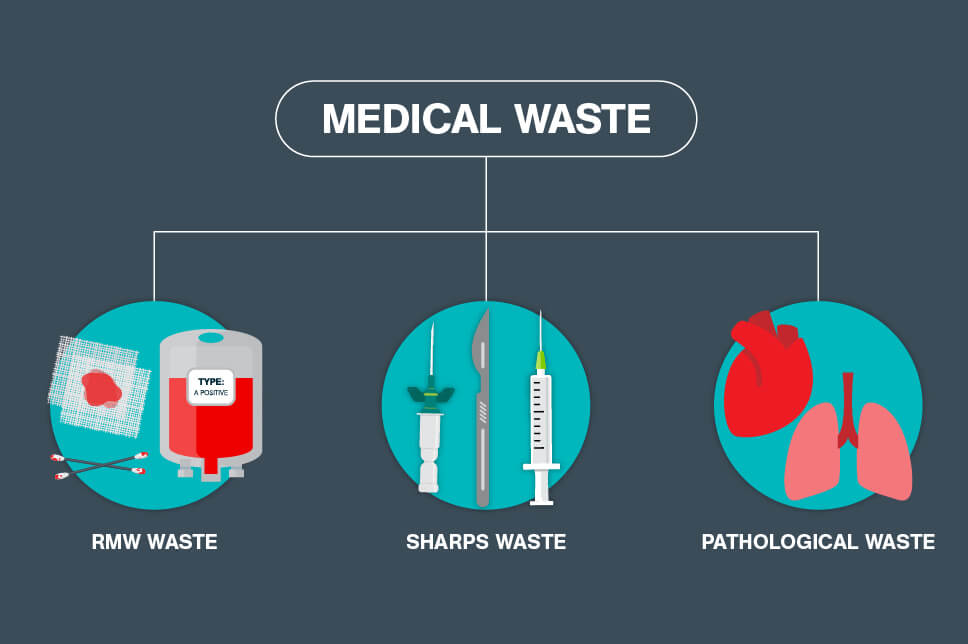Responsible Solutions: Recognizing Medical Waste Disposal Provider
In the world of health care, the correct disposal of clinical waste is a critical facet that demands careful consideration. The relevance of managing medical waste responsibly surpasses simple compliance with regulations; it straight influences public health and environmental safety. As health care centers generate various kinds of waste that call for customized handling, understanding the subtleties of clinical waste disposal services is paramount. By checking out the details of this necessary procedure, we can shed light on the finest techniques, benefits of specialist services, and sustainable options offered.
Value of Correct Clinical Waste Disposal
Correct medical waste disposal is essential in keeping a secure and hygienic setting within health care facilities. In health care setups, different types of waste are produced daily, consisting of infectious products, sharps, expired drugs, and chemical substances.

Kinds of Medical Waste
Within health care facilities, a varied range of waste products identified as medical waste is generated, each requiring details handling and disposal techniques. Clinical waste can be categorized into a number of types based on its attributes and possible threats. Contagious waste, such as used needles, swabs, and cultures, poses a considerable threat of spreading out infections and need to be carefully dealt with to avoid any type of possible harm. Contaminated materials includes chemicals, pharmaceuticals, and certain products that might be hazardous or reactive. These materials call for specific disposal approaches to decrease environmental effect and make sure safety and security. Pathological waste, that includes tissues, body organs, and body parts, demands appropriate disposal to appreciate the self-respect of the departed and protect against any biohazards. Pharmaceutical waste, like ended medications and chemotherapy medicines, have to be disposed of appropriately to protect against misuse or environmental contamination. Comprehending the different sorts of clinical waste is critical for health care facilities to carry out efficient waste administration techniques and secure public health and the environment (Medical Waste Disposal Services).
Rules and Conformity
Medical care centers must stick to rigorous guidelines pertaining to the handling and disposal of medical waste to guarantee compliance with legal demands and secure public health. These policies are established to stop the spread of infections, safeguard the setting, and keep the security of healthcare employees and the basic public. Numerous regulatory bodies, such as the Environmental Defense Company (EPA), the Occupational Security and Wellness Administration (OSHA), and the Department of Transportation (DOT), have details standards that healthcare facilities have to adhere to.
To follow these guidelines, health care centers need to effectively set apart, store, transport, and get rid of different types of clinical waste. This includes sharps waste, contagious waste, hazardous waste, and pharmaceutical waste, each needing particular taking care of procedures. Facilities should likewise maintain precise records of waste generation and disposal to demonstrate compliance throughout inspections.
Non-compliance with medical waste policies can lead to severe fines, fines, and damages to the facility's reputation. As a result, it is necessary for medical care centers to remain informed regarding the most recent guidelines and execute robust compliance steps to protect public wellness and the atmosphere.
Advantages of Expert Disposal Providers
Involving professional medical waste disposal services uses medical care centers a reputable and efficient option for managing unsafe materials. By outsourcing this crucial job to professionals, healthcare centers can guarantee conformity with policies while concentrating on offering top quality care to patients. One of the essential benefits of expert disposal services is the expertise they bring to the table. These services use skilled experts that are fluent in taking care of various kinds of clinical waste, making certain proper partition, packaging, transportation, and disposal.
Additionally, expert disposal services make use of cutting edge tools and comply with industry finest methods to reduce ecological effect and lower the danger of contamination. This not only promotes a much safer work atmosphere for health care team but also adds to overall public see it here wellness and security. In addition, outsourcing Extra resources medical garbage disposal can cause cost savings in the lengthy run by eliminating the requirement for in-house monitoring and disposal systems.
Lasting Practices in Medical Care

One key sustainable method in health care is waste reduction. By executing methods to lower unneeded packaging, single-use products, and general waste generation, health care facilities can dramatically reduce the quantity of waste sent out to garbage dumps or incineration. In addition, reusing programs for materials like paper, glass, and plastic can even more reduce the environmental impact of health care operations.

Verdict
In verdict, correct clinical garbage disposal is critical in preserving a healthy and risk-free setting for both medical care employees and the basic public. Recognizing the various sorts of medical waste, adhering to policies and compliance requirements, and using specialist disposal solutions are necessary action in accountable waste monitoring. By taking on lasting techniques in healthcare centers, we can decrease ecological influence and make sure the health of all individuals associated with the health care industry.
As health care centers produce different types of waste that call for specialized handling, recognizing the nuances of clinical waste disposal services is vital.Within health care facilities, a diverse array of waste products classified as medical waste is created, each calling for specific handling and disposal approaches. Recognizing the numerous types of medical waste is important for health care centers to carry out effective waste management techniques and secure public wellness and the atmosphere.
By carrying out methods to lower unneeded product packaging, single-use items, and general waste generation, healthcare centers can significantly reduce this website the amount of waste sent out to garbage dumps or incineration. Recognizing the different types of clinical waste, complying with regulations and compliance requirements, and using specialist disposal solutions are vital actions in liable waste administration.